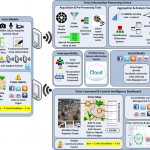 One of the earliest posts I made on this blog was around the time of the riots in London in 2011. It transpired that many of the thugs out looting London’s streets were co-ordinating their efforts via social and mobile networks. This, coupled with the spread of misinformation online prompted some officials to suggest social networks should be banned during periods of civil unrest.
One of the earliest posts I made on this blog was around the time of the riots in London in 2011. It transpired that many of the thugs out looting London’s streets were co-ordinating their efforts via social and mobile networks. This, coupled with the spread of misinformation online prompted some officials to suggest social networks should be banned during periods of civil unrest.
Now, it should be said that research not long after the riots actually proved that social media is actually a force for good during such events, but the use of social for nefarious means, or at least the fear of it, has not gone away.
Earlier this month, Robert Hannigan from GCHQ branded social networks extremist control hubs. He called on the major tech firms behind networks such as Twitter and WhatsApp to do more to work with security services.
Of course, it isn’t just organized crime that is supposedly using social media. A recent paper from Birmingham University has recently outlined how six murderers were using Facebook as part of their crime.
The paper, believed to be the first of its kind, identifies 48 cases of ‘Facebook murder’ from around the world over a 5 year period. The research identifies six distinct type of killer:
- Reactor – Reacts to content posted on Facebook by attacking the victim face to face. This may be immediately after viewing the content that makes them angry or there may be a time delay in which they revisit the content and ruminate over its meaning.
- Informer – Uses Facebook to inform others that they intend to kill the victim, that they have killed the victim, or both. Informers use Facebook as a way of demonstrating their control over the victim and the situation.
- Antagonist – Engages in hostile exchanges on Facebook that escalate into face to face fatal violence. Antagonists may seek to introduce a physical advantage when the conflict goes offline through arming themselves with weapons.
- Fantasist – Uses Facebook to perform or indulge in a fantasy. For fantasists, the line between fantasy and reality has become increasingly blurred and the homicide may be a way of maintaining the fantasy or preventing others from discovering the deception.
- Predator – Creates and maintains a fake profile to lure a victim and meet them offline. May draw upon the information available on the victim’s profile to identify and exploit vulnerabilities to establish grounds upon which to develop a relationship
- Imposter – posts in the name of someone else. This could be the victim in order to create the illusion they are still alive or another person to gain access to and monitor the victim’s profile.
“We had been coming across references to ‘Facebook Murder’ in the media over the past few years but there had been no research in this area. We wanted to see whether homicides in which Facebook was reported to have been involved were any different to other homicides and found that on the whole they are not – victims knew their killers in most cases, and the crimes echoed what we already know about this type of crime,” the researchers say.
Are social networks to blame?
Well, no, we shouldn’t go that far. The researchers are at pains to point out that there is nothing inherently bad about social networks. They suggest that social networks are no more to blame than knives are for stabbings. The intention of the killer is what we should focus on.
Indeed, there is much to suggest that social networks can be a force for good in law enforcement. Over the summer I attended the SMILE conference in Birmingham, where researcher Babak Akghar spoke about the ATHENA project that is being run by West Yorkshire police.
The project is aiming to bring the public into policing a lot more than is currently the case by using social and mobile tools as a force for good. The project team concede that the public are usually first on the scene of an incident, and are often therefore well placed to relay crucial information to officials.
Thus far, this information, whilst captured by the public, is seldom tapped into by emergency services. ATHENA hopes to change that by developing mobile applications that enhance the information sharing capabilities of the public.
So, whilst I agree that the tech companies should not be resting on their laurels when it comes to security, we should also be careful not to throw the baby out with the bath water. Social networks proved they could be useful during the 2011 riots, and the ATHENA project suggests they could also be useful for fighting crime.
I think that it's overwhelmingly a force for good. Any excuse to crack down on our civil liberties though.
Interesting, yet a bit scary at the same time.